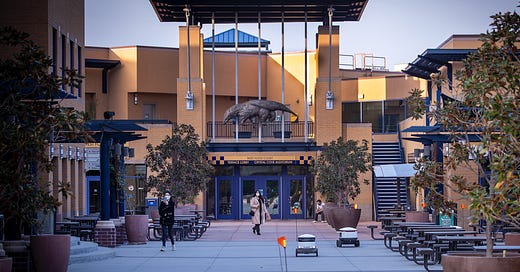Matt Taibbi on Free Speech at the University of California
As reported today by Racket News, new FOIA disclosures from UC Irvine show school faculty and administrators struggling with its own famed commitment to academic freedom.
My friend Matt Taibbi, whose Substack Racket News features some of the best journalism out there, published a piece today entitled, “The University of California: At War With Its Own Proud Speech Tradition.” While the second half of the article is behind a paywall (worth subscribing, in my opinion), I’m sharing here the portion that is available on the free preview, which makes reference to my history with the University of California. Taibbi writes:
In his new “FOIA Files” writeup of the 1,400 pages of Freedom of Information documents Racket received from the University of California, Irvine, James Rushmore highlights an extraordinary Academic Advisory Board meeting, convened at the height of the pandemic in December, 2020.
In it, UC faculty members are so angry about academics defying Covid-19 consensus, they start to re-think academic freedom. They single out Hoover Institute fellow Scott Atlas at Stanford for questioning consensus on lockdowns, social distancing, masking, and other policies. Atlas was described as someone who’d “hit us very hard… in the area of public health,” being on the “wrong” side of a “clear ‘right’ and ‘wrong.’” One UC San Francisco medical professor raised a question pitting “‘academic freedom’ vs. institutions passing on their obligation to deal with faculty who say and do things with significant chance to harm the public,” asking, “What is freedom of speech in this context?” In other words, how much can freedom can we really tolerate?
Dr. Aaron Kheriaty, [one of] the Murthy plaintiffs, was the director of UC-Irvine’s medical ethics program and a professor of psychiatry and human behavior who also worked in person with COVID patients every day at the UCI Medical Center. He was fired roughly a year after the meeting referenced in this FOIA document for opposing vaccine mandates, guilty of the identical crime Atlas is charged with in the docs: being a “threat to the health and safety of the community.” The Los Angeles Times used scare quotes to describe Kheriaty as someone who “refused to get vaccinated, citing ‘natural immunity,’” so the following comment about the UC docs is apt:
“Even the excerpt you sent referencing Scott Atlas has ‘academic freedom’ in scare quotes, opposing it to the need to protect people from the harms of wrongthink and the establishment’s own infallible right-thinking on public health,” Kheriaty says. “These people live in an ideological bubble and can’t see their way out of it, even for the sake of protecting free speech and academic freedom.”

Kheriaty notes that the University of California has a terrific academic freedom policy passed in 1970 based on a “free exchange of ideas, and of pursuit of the truth wherever it may lead — popular or unpopular though that may be.” It bars bureaucratic interference in speech in the strongest of terms:
It is the Regents’ policy that no campus, no academic college, no department, and no instructor distort the instructional process in a manner which deviates from the responsibilities inherent in academic freedom. This includes introducing subject matter foreign to the regular course content, using classroom facilities and supplies, or other nonfree speech areas for political purposes.
That policy was introduced back when “liberals actually cared about [academic freedom] and understood its importance,” Kheriaty says. “They now see this institutional policy as an obstacle to their goals but can’t come out and attack it directly, so we end up with the kind of indirect attacks you uncovered in these FOIA documents.”
Kheriaty’s own case was a more direct attack, and it’s described in an enraging account he wrote on his Human Flourishing site shortly after his dismissal. In the new documents go, the Atlas episode wasn’t the only unnerving one. The materials show ongoing tension between the UC’s strong tradition, which grew out of the Free Speech Movement at Berkeley in 1964, and its infantilizing present, in which professors and administrators alike are seen applying pressure to their own policies through constant questions seeking more of a “balance” between freedom and safety.
The article goes on to discuss some comments from UC President Michael Drake, who was responsible for my firing, on the need to “balance” free speech with safetyism. Taibbi rightly notes in this context that “balance” functions as a “rights-chiseling watchword of the day,” which Drake repeated three times like a mantra. Taibbi notes this same pattern elsewhere, including in the ironically named UC Center for Free Speech and Civic Engagement:
Throughout the FOIA docs, the UC’s Center for Free Speech and Civic Engagement engages in discussions that posit academic or speech freedom as half of a rhetorical pairing. Academic freedom vs. “abuse and harm,” “free expression and social justice,” or any of a number of debates about weighing inquiry/speech and the “commitment to diversity and inclusion,” “preservation of public health,” “rising disbelief in institutions,” or a dozen other concerns.
Questions about “balance” or “accountability” would inevitably be followed by a proposition about a new restriction.
Taibbi goes on to explain that this trend is global: “Europe’s Digital Services Act, based on the same “balance” concept, became law last February.” The entire piece, and the linked “FOIA Files” article by James Rushmore are worth a read if you’re a Racket News subscriber.





Leftists were for free speech until they became the establishment they once despised.
I wonder how much money UC received from pharmaceutical companies for “research”. It seems to make a difference in acceptable speech.